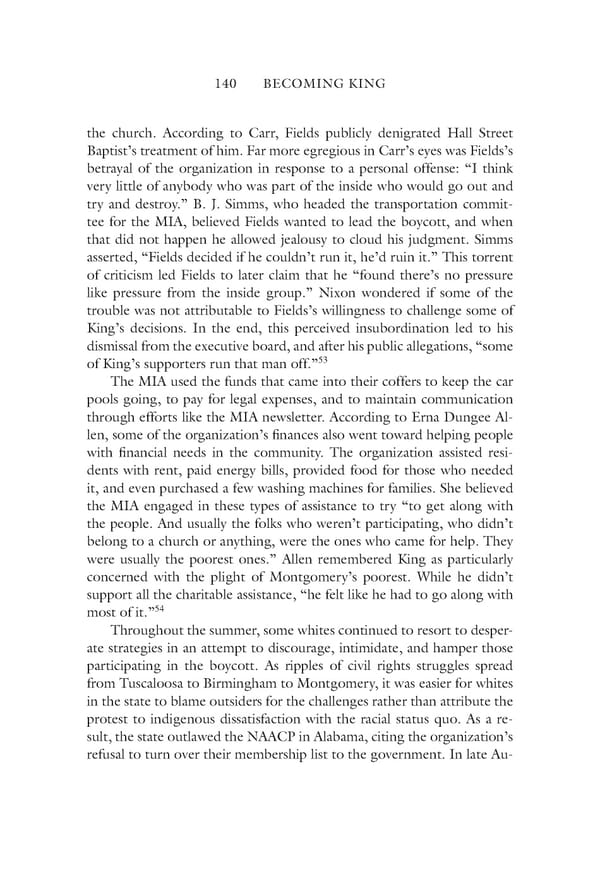140 BECOMING KING the church. According to Carr, Fields publicly denigrated Hall Street Baptist’s treatment of him. Far more egregious in Carr’s eyes was Fields’s betrayal of the organization in response to a personal offense: “I think very little of anybody who was part of the inside who would go out and try and destroy.” B. J. Simms, who headed the transportation commit- tee for the MIA, believed Fields wanted to lead the boycott, and when that did not happen he allowed jealousy to cloud his judgment. Simms asserted, “Fields decided if he couldn’t run it, he’d ruin it.” This torrent of criticism led Fields to later claim that he “found there’s no pressure like pressure from the inside group.” Nixon wondered if some of the trouble was not attributable to Fields’s willingness to challenge some of King’s decisions. In the end, this perceived insubordination led to his dismissal from the executive board, and after his public allegations, “some 53 of King’s supporters run that man off.” The MIA used the funds that came into their coffers to keep the car pools going, to pay for legal expenses, and to maintain communication through efforts like the MIA newsletter. According to Erna Dungee Al- len, some of the organization’s finances also went toward helping people with financial needs in the community. The organization assisted resi- dents with rent, paid energy bills, provided food for those who needed it, and even purchased a few washing machines for families. She believed the MIA engaged in these types of assistance to try “to get along with the people. And usually the folks who weren’t participating, who didn’t belong to a church or anything, were the ones who came for help. They were usually the poorest ones.” Allen remembered King as particularly concerned with the plight of Montgomery’s poorest. While he didn’t support all the charitable assistance, “he felt like he had to go along with 54 most of it.” Throughout the summer, some whites continued to resort to desper- ate strategies in an attempt to discourage, intimidate, and hamper those participating in the boycott. As ripples of civil rights struggles spread from Tuscaloosa to Birmingham to Montgomery, it was easier for whites in the state to blame outsiders for the challenges rather than attribute the protest to indigenous dissatisfaction with the racial status quo. As a re- sult, the state outlawed the NAACP in Alabama, citing the organization’s refusal to turn over their membership list to the government. In late Au-
 Becoming King: Martin Luther King Jr. Page 160 Page 162
Becoming King: Martin Luther King Jr. Page 160 Page 162